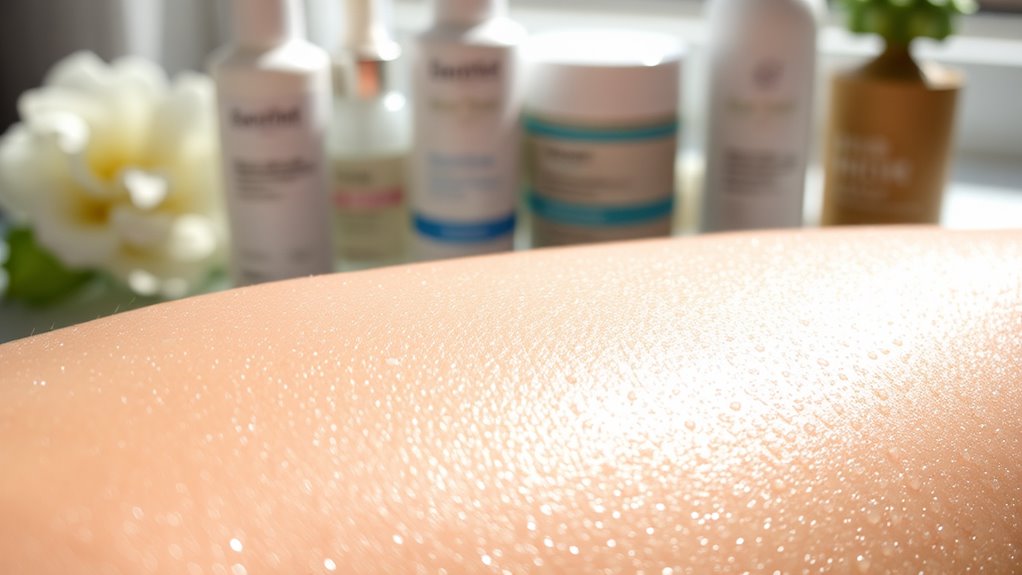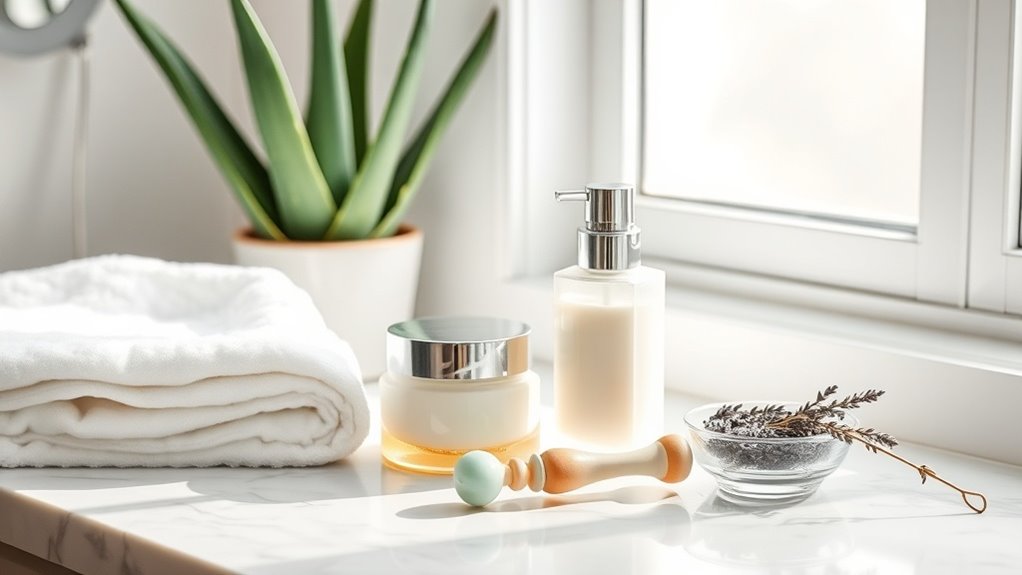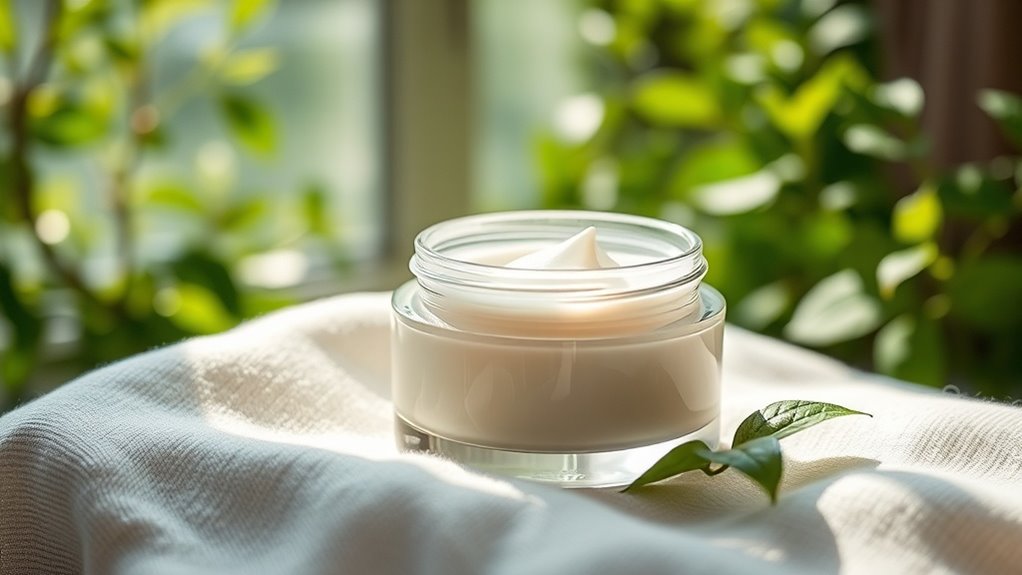7 Signs Your Skin Barrier Is Damaged – And How to Heal It
If you’ve noticed changes in your skin’s condition—like increased sensitivity, dryness, or persistent itchiness—your skin barrier might be damaged. This essential barrier protects against environmental factors, and when compromised, it can lead to various issues such as breakouts or slow healing times. Understanding these signs is the first step towards recovery. Let’s explore how you can effectively heal your skin and restore its health.
Increased Sensitivity and Redness
When your skin barrier is compromised, you might notice increased sensitivity and redness as prominent symptoms. This heightened reactivity often results from irritants penetrating deeper layers of your skin, causing inflammation.
You may find that products that once felt soothing now aggravate your skin. To repair your skin barrier, you should focus on using gentle, hydrating products free of harsh ingredients. Look for ceramides, fatty acids, and antioxidants, as these elements help strengthen and restore your barrier function. Additionally, ensuring that you incorporate essential steps in skincare can significantly accelerate your skin’s healing process.
Incorporating a fragrance-free moisturizer can also minimize irritation. Remember to avoid over-exfoliation, which can further damage your skin.
Dryness and Flakiness
Dryness and Flakiness
Dryness and flakiness are key indicators that your skin barrier is in distress. When your skin isn’t retaining moisture properly, it can become rough and uncomfortable.
Here are three common causes of dryness and flakiness:
-
Harsh Products: Using exfoliating cleansers or toners too often can strip your skin of essential oils.
-
Environmental Factors: Wind, cold weather, or indoor heating can sap moisture and lead to dry patches.
-
Dehydration: Not drinking enough water can affect your skin’s health, making it look and feel parched.
To remedy dryness, focus on using gentle, hydrating products, moisturize regularly, and ensure you’re drinking enough fluids. Additionally, consider avoiding harsh products that can exacerbate dryness and enhance skin irritation.
Breakouts and Acne
When your skin barrier is compromised, inflammation can become a major issue, leading to breakouts and acne. Hydration is key in maintaining a healthy skin barrier; without it, your skin can react more aggressively to irritants. Recognizing this connection is essential for managing your skin’s health effectively. Moreover, a weakened barrier can lead to increased sensitivity, making it crucial to assess and address any underlying issues.
Inflammation Triggers Breakouts
Although your skin may appear healthy on the surface, underlying inflammation can significantly trigger breakouts and acne.
This inflammation often stems from various factors that can compromise your skin’s barrier and lead to irritation. Identifying these triggers can help you manage your skin more effectively.
Here are three common inflammation triggers to consider:
-
Harsh Skincare Products: Ingredients like alcohol or fragrances can strip your skin of its natural oils, causing irritation.
-
Dietary Choices: Consuming excessive dairy or sugar can increase inflammation levels, leading to problematic skin.
-
Stress: High stress can elevate cortisol levels, which can exacerbate inflammation and trigger acne.
Acne and Skin Hydration
Proper hydration is essential for maintaining healthy skin, especially if you’re struggling with acne. When your skin lacks moisture, it might overproduce oil, leading to clogged pores and more breakouts.
Hydrated skin helps support the skin barrier, making it less susceptible to irritation and inflammation. Incorporating a hydrating serum or moisturizer formulated for acne-prone skin can help balance oil production while keeping your skin nourished.
Look for products containing hyaluronic acid or glycerin, which attract moisture without clogging pores. Additionally, drink plenty of water daily to support overall skin health.
Itching and Irritation
If you’re experiencing persistent itching and irritation on your skin, it may be a sign that your skin barrier is compromised.
When your barrier isn’t functioning properly, it can lead to discomfort and exacerbate existing skin issues.
Consider these key factors:
-
Environmental Triggers: Pollution, extreme weather, and allergens can irritate your skin, making it more sensitive and prone to itching.
-
Harsh Products: Using products with alcohol, fragrances, or sulfates can strip your skin of essential moisture and cause irritation.
-
Skin Conditions: Conditions like eczema or psoriasis can flare up when your skin barrier is damaged, leading to increased itching and redness.
Taking note of these elements can help you identify and address factors contributing to your discomfort. Additionally, during winter months, opt for winter skincare swaps that can enhance your routine, ensuring your skin stays hydrated and protected amidst the harsh cold.
Tightness and Discomfort
If your skin feels tight or uncomfortable, it might signal a compromised barrier. Various factors, including environmental stressors and harsh products, can lead to this discomfort. Fortunately, there are effective relief strategies to help restore your skin’s health and improve your overall comfort. Incorporating a gentle cleansing routine can also aid in maintaining hydration while preventing over-drying.
Causes of Tightness
When your skin feels tight and uncomfortable, it often signals that the skin barrier is compromised. Several factors contribute to this sensation, affecting your skin’s overall health.
Here are three common causes of tightness:
-
Environmental Stressors: Extreme weather conditions, whether it’s excessive heat or cold, can strip moisture from your skin, leading to tightness.
-
Harsh Skin Products: Using products with alcohol or strong fragrances irritates your skin and disrupts its natural balance.
-
Overcleansing: Washing your face too often or using abrasive exfoliants can remove essential oils, leaving your skin feeling dry and tight.
Understanding these causes is vital for addressing discomfort and restoring your skin barrier effectively.
Signs of Discomfort
A compromised skin barrier often leads to visible signs of discomfort, manifesting as tightness and irritation.
You may notice your skin feels uncomfortable, as if it’s stretching or constricting. This tightness can occur regardless of your skin type and may be accompanied by redness or flakiness.
You might also experience heightened sensitivity, where even gentle products irritate your skin. This discomfort can significantly impact your daily routine, making it challenging to apply makeup or skincare products without a burning sensation.
Observing these signs is crucial; they indicate your skin needs immediate attention. Ignoring these symptoms can lead to further damage, so it’s essential to identify your skin barrier’s health and address any distress it shows.
Relief Strategies Available
To alleviate the tightness and discomfort caused by a damaged skin barrier, it’s essential to implement targeted relief strategies. Here are three effective methods to consider:
-
Moisturize Regularly: Use a gentle, hydrating moisturizer containing ingredients like hyaluronic acid or ceramides to restore moisture and strengthen the barrier.
-
Limit Exfoliation: Avoid harsh scrubs and chemical exfoliants that can further irritate your skin. Stick to mild cleansers that respect your skin’s natural barrier.
-
Protect from Environmental Stressors: Shield your skin from harsh weather conditions by wearing protective clothing and using broad-spectrum sunscreen to prevent further damage.
Slower Healing Time
Healing is a natural response of your body, but if you notice it taking longer than usual for cuts, scrapes, or blemishes to resolve, it could signal a damaged skin barrier.
When your skin barrier isn’t functioning properly, it can hinder your body’s ability to repair itself efficiently. This slower healing time often results from increased water loss and heightened sensitivity, making the skin more susceptible to infections and inflammation.
Environmental factors, such as harsh weather or irritants, can further impede healing. Additionally, over-cleansing your skin can exacerbate damage to the barrier, leading to more pronounced healing delays.
To support your skin’s recovery, focus on gentle cleansing, moisturizing with barrier-repairing ingredients, and avoiding aggressive treatments.
Monitoring these changes can help you address the underlying problems and restore your skin’s vital function more effectively.
Dullness and Uneven Texture
Noticing dullness and uneven texture on your skin can be frustrating, and it often indicates a compromised skin barrier. When your barrier is damaged, it struggles to retain moisture and defend against environmental aggressors, leading to lackluster skin. To help restore your skin’s natural glow and texture, consider these steps:
-
Moisturize Regularly: Use a hydrating moisturizer that contains ceramides or hyaluronic acid to lock in moisture.
-
Exfoliate Gently: Incorporate a mild exfoliant to remove dead skin cells without overdoing it, which could further irritate your skin.
-
Avoid Harsh Products: Stay away from alcohol-based products and strong fragrances that can irritate and aggravate your skin barrier.
Additionally, addressing main causes of dull skin through a balanced skincare routine can significantly improve your skin’s appearance and overall health. Taking these actions can improve your skin’s appearance and overall health.




